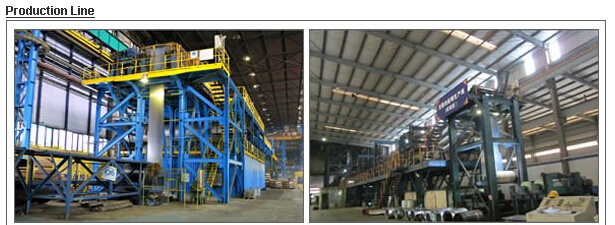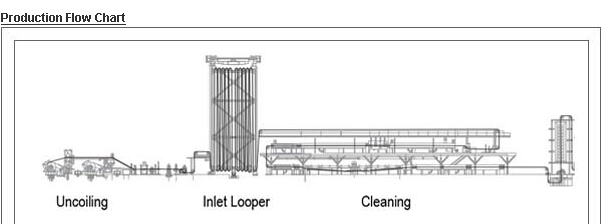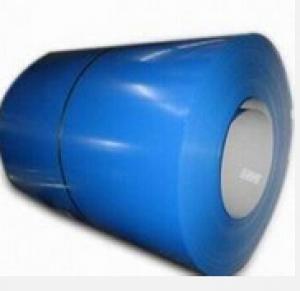Excellent Mechanical Property PPGI Steel Coil
- Loading Port:
- China Main Port
- Payment Terms:
- TT OR LC
- Min Order Qty:
- -
- Supply Capability:
- -
OKorder Service Pledge
OKorder Financial Service
You Might Also Like
Specification
1. Thickness: 0.3-0.8mm
2. Width: 914-1250mm
3. Inner Diameter: 508mm
4. Weight of Steel Coil: 3-15MT
5. Available Dipped Layer: 50-150g/m2
6. Surface Texture: Normal Coated
7. Type of coating structure: 2/1 Coat the top surface of the steel sheet twice, coat the bottom surface once, and bake the sheet twice.
8. Front Side Paint Thickness: 15-20μm (bottom paint+top paint)
9. Back Side Paint Thickness: 5-10μm
Mechanical Properties
1. Mechanical properties of base metals
Grade | Tensile Test | ||
Yield Strength MPa | Tensile Strength MPa | Elongation A80mm % ≥ | |
DC51D+Z | 140-350 | 270-500 | 22 |
DC52D+Z | 140-300 | 270-420 | 26 |
DC53D+Z | 140-300 | 270-380 | 30 |
2. Common performance of front coating
(1). Thickness: ≥20μm
(2). Pencil Hardness: 2H
(3). 60° specular glossiness of coating: >60
(4). 180°bend: ≤3T
(5). Impact: ≥9J
(6). Salt Fog Resistant: ≥500h
(7). Color difference: <3ΔE


- Q:What are the factors that affect the quality of steel coils?
- The quality of steel coils can be influenced by various factors. To begin with, the composition of the steel itself plays a vital role in determining its quality. Impurities like sulfur or phosphorus can have a negative impact on the strength, durability, and overall performance of the steel. Additionally, the quality of the steel is affected by its carbon content, alloying elements, and heat treatment. Furthermore, the quality of the steel coils is greatly affected by the manufacturing process and techniques utilized during production. Factors such as the cleanliness of the production environment, the precision of the rolling and cooling processes, and the control of temperature and pressure throughout manufacturing all contribute to the final quality of the coils. Additionally, the surface quality of the steel coils is a crucial factor. Any defects or imperfections on the surface, such as scratches, dents, or corrosion, can compromise the integrity and functionality of the coils. It is essential to handle, store, and transport the coils properly to maintain their surface quality. Moreover, the mechanical properties of the steel coils, including tensile strength, yield strength, and elongation, are essential indicators of their quality. These properties depend on various factors, such as the type of steel, its thickness, and the processing conditions. Lastly, external factors such as environmental conditions, like humidity and temperature, can affect the quality of steel coils. Exposure to moisture or extreme temperatures can lead to corrosion or other forms of degradation, impacting the overall quality and lifespan of the coils. In conclusion, the quality of steel coils is influenced by several factors, encompassing the composition of the steel, the manufacturing process, surface quality, mechanical properties, and external environmental conditions. It is crucial to carefully control and monitor these factors to produce high-quality steel coils that meet the desired specifications and standards.
- Q:How are steel coils used in the production of containers?
- Steel coils are used in the production of containers as they are the primary material for manufacturing container bodies. These coils are shaped and welded into the desired container shape, providing strength and durability to the final product.
- Q:How are steel coils used in the production of shelving units?
- Steel coils are used in the production of shelving units by being cut, shaped, and formed into the necessary components such as uprights, shelves, and brackets. These coils are unrolled and fed into machines which use different processes like stamping, bending, and welding to transform them into the desired shelving parts.
- Q:I'm planning to buy a pair of Doc Marten boots but I want some steel toed ones. I don't know if all of them are steel toed, or only some of them, or what?
- mine arent steel-toed....theyre upper leather certain types of boots maybe steel-toed in case the person wearing them is in construction...
- Q:How do steel coils contribute to the sustainability of construction projects?
- There are several ways in which steel coils contribute to the sustainability of construction projects. First and foremost, steel is a highly durable and long-lasting material. Manufactured to withstand extreme weather conditions, corrosion, and other external factors, steel coils are ideal for construction projects that require strength and longevity. This durability reduces the need for frequent repairs and replacements, resulting in minimized waste and resource consumption over time. Moreover, steel coils are recyclable. Once their lifespan in a construction project comes to an end, steel coils can be easily and efficiently recycled. This recycling process requires less energy compared to the production of new steel, leading to reduced carbon emissions and environmental impact. Furthermore, the recycled steel can be utilized in various industries, including construction, thereby promoting sustainability and resource conservation. Additionally, steel coils contribute to the sustainability of construction projects by offering design flexibility. Being a versatile material, steel can be easily shaped, cut, and molded into different forms and sizes. This allows for efficient construction practices, reducing material wastage and optimizing resource utilization. Furthermore, the lightweight nature of steel coils enables convenient transportation and installation, further decreasing fuel consumption and associated greenhouse gas emissions. Lastly, steel coils contribute to the sustainability of construction projects through their energy efficiency. Being an excellent conductor of heat and electricity, steel is ideal for energy-efficient buildings. By incorporating steel coils into the construction of walls, roofs, and other components, buildings can be effectively insulated, resulting in reduced energy consumption for heating and cooling. Consequently, occupants benefit from lower energy bills, while the overall carbon footprint of the construction project is reduced. In conclusion, steel coils contribute to the sustainability of construction projects through their durability, recyclability, design flexibility, and energy efficiency. By utilizing steel coils, construction projects can minimize waste, conserve resources, reduce environmental impact, and optimize energy consumption, thereby promoting a more sustainable and eco-friendly approach to construction.
- Q:How are steel coils handled during loading and unloading?
- Steel coils are typically handled using cranes, forklifts, or coil hooks during loading and unloading. The coils are carefully lifted, secured, and transported to their respective destinations. Special attention is paid to ensure proper balance, stability, and safety measures are followed to prevent any damage or accidents during the process.
- Q:What is the average lead time for receiving replacement steel coils?
- The average lead time for receiving replacement steel coils can vary depending on various factors such as the supplier, location, and specific requirements. It is recommended to consult with the supplier or manufacturer directly to get an accurate estimate of the average lead time for receiving replacement steel coils.
- Q:How are steel coils manufactured?
- Steel coils are manufactured through a multi-step process that involves heating and shaping steel slabs, followed by passing them through a series of rolling mills to reduce their thickness and increase their length. The coils are then cooled, inspected for quality, and finally, wrapped and ready for shipping.
- Q:How are steel coils used in the manufacturing of railroads?
- Steel coils are used in the manufacturing of railroads as they are the primary material for constructing railway tracks. These coils are processed to form rails, which are then laid down to create the tracks on which trains run. The durable and strong nature of steel coils ensures the tracks can withstand the high loads and stresses imposed by trains, ensuring safe and efficient transportation.
- Q:How are steel coils used in the manufacturing of engine components?
- Steel coils are used in the manufacturing of engine components as they provide a strong and durable material for various parts. These coils are typically processed and shaped into specific components such as pistons, crankshafts, cylinder heads, and connecting rods, which are vital for the proper functioning of an engine. The high strength and heat resistance of steel make it an ideal choice for these critical components, ensuring the engine's reliability and performance.
1. Manufacturer Overview |
|
|---|---|
| Location | |
| Year Established | |
| Annual Output Value | |
| Main Markets | |
| Company Certifications | |
2. Manufacturer Certificates |
|
|---|---|
| a) Certification Name | |
| Range | |
| Reference | |
| Validity Period | |
3. Manufacturer Capability |
|
|---|---|
| a)Trade Capacity | |
| Nearest Port | |
| Export Percentage | |
| No.of Employees in Trade Department | |
| Language Spoken: | |
| b)Factory Information | |
| Factory Size: | |
| No. of Production Lines | |
| Contract Manufacturing | |
| Product Price Range | |
Send your message to us
Excellent Mechanical Property PPGI Steel Coil
- Loading Port:
- China Main Port
- Payment Terms:
- TT OR LC
- Min Order Qty:
- -
- Supply Capability:
- -
OKorder Service Pledge
OKorder Financial Service
Similar products
New products
Hot products
Related keywords





























